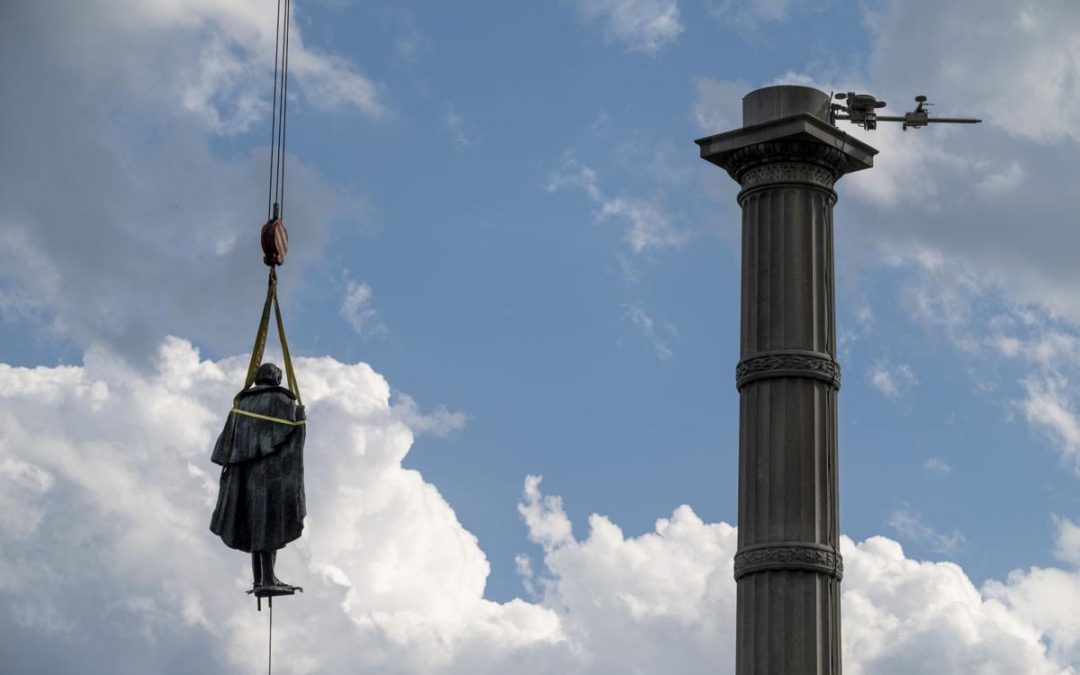SOUTH CAROLINA — Heritage Act Protecting Confederate Monuments Faces State Supreme Court Test
COLUMBIA — The long-debated question over the constitutionality of a controversial state law that blocks South Carolina cities from taking down Confederate monuments and other war memorials is about to be heard by the state Supreme Court.
And there’s a chance the court could opt to avoid that central issue, since top Republican officials have encouraged the justices to toss the dispute on technical grounds.
Jennifer Pinckney, the widow of slain state senator and Emanuel AME Church Pastor Clementa Pinckney, filed the lawsuit to be heard May 25 along with Columbia Councilman Howard Duvall and former state Sen. Kay Patterson.
The trio contends the Heritage Act — the law passed by the Legislature as a compromise measure when they voted to remove the Confederate battle flag from the Statehouse dome in 2000 — violates the state constitution by improperly constraining lawmakers and local governments from removing or modifying monuments and other historical markers.
Rather than through a more achievable simple majority, the law requires a two-thirds vote by the General Assembly to take down any monuments or rename any public areas dedicated for historical figures from a list of 10 major wars, including the Civil War, or for Native Americans or African Americans.
Critics have long argued the two-thirds requirement unconstitutionally restricted future Legislatures from taking action by simple majority. “By allowing a past majority — from twenty years ago — to control future legislatures, neither the people nor their elected representatives can be fully heard,” the plaintiffs, represented by state Sen. Gerald Malloy, D-Hartsville, and attorney Matthew Richardson, wrote in their brief.
Even Republican Attorney General Alan Wilson agreed on that point, writing in a non-binding 2020 opinion that the two-thirds threshold should be struck down. But Wilson said the rest of the law should remain in tact.
With so much unsettled division over the law, Wilson encouraged the state Supreme Court to take the case and potentially determine whether the act passes constitutional muster.
The lawsuit names Gov. Henry McMaster, House Speaker Jay Lucas and Senate President Harvey Peeler as defendants due to their official roles enforcing the law.
The plaintiffs also claim the law violates “Home Rule” by preventing local governments from controlling monuments and markers in their own areas while delegating that authority to the state instead. And they argue the selection of 10 wars and two ethnic heritages violates a prohibition against arbitrary classifications. Lucas and Peeler declined to comment on a pending legal issue, but McMaster’s spokesman Brian Symmes said the governor “maintains that the Heritage Act provides a good framework for dealing with questions around historical monuments.”
“It preserves monuments while allowing South Carolinians to voice their concerns through their elected representatives,” Symmes said.
“That thoughtful, democratic process has proven to be important in the past and needs to be prioritized moving forward,” he added.
Some of the legal arguments put forward by the state officer lawyers could still prevent the court from deciding the main issue in the case.
In a 22-page response brief, Lucas’ attorney noted that no attempted legislation to amend or repeal the Heritage Act has ever received a simple majority without also clearing the two-thirds threshold, therefore suggesting there is no pressing legal dispute for the court to address.
Nine bills have been introduced to alter something protected by the Heritage Act since it became law. Four of them passed overwhelmingly and the other five never received a vote. Most famously, the state House voted 94-20 and the Senate 37-3 to remove the Confederate battle flag from the Statehouse grounds after the 2015 Emanuel AME shooting.
Lucas’ attorney called the lawsuit “a generalized complaint about a legislative policy decision.”
“They do not like the Heritage Act,” the attorney, Grayson Lambert, wrote of the plaintiffs. “But that does not make the Heritage Act unconstitutional. And its constitutionality is the only question before the Court.”
Even if the two-thirds requirement gets struck down, Lambert echoed Wilson in saying the rest of the law should remain. He said the designation of the 10 wars and two ethnic classes is allowed because the law focuses on “monuments and memorials to the most impactful wars and ethnicities on the State’s history.”
Arguments over the case will be heard in the S.C. Supreme Court at 10:30 a.m. May 25. Plaintiffs will have 20 minutes to make their case and defendants will have 20 minutes to respond followed by a five-minute rebuttal.
–postandcourier.com



